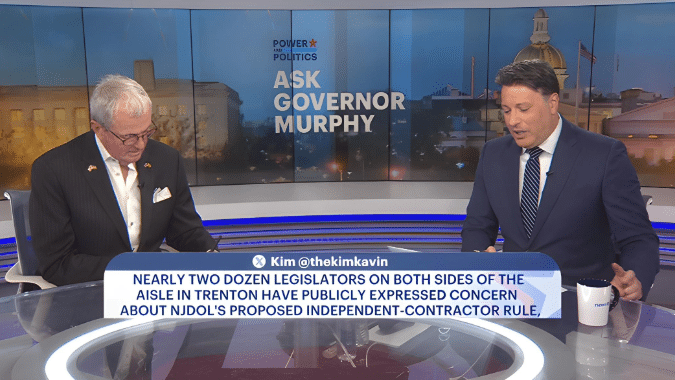Lame-duck voting sessions are notoriously unpredictable in New Jersey, so any expectations about what would happen as 2019 turned to 2020 were tentative at best. Now that it’s over, a tally on how businesses did in the period between Election Day and the swearing in of a new Legislature shows a number of moderately pro-business policies getting approved.
Perhaps the two biggest successes were stopping both legislation changing the definition of independent contractors and a bill dramatically expanding bad faith lawsuits. NJBIA were leaders in the fight against both measures, which failed to receive final legislative approval.
“Our government affairs team did a great job keeping on top of literally hundreds of bills that could impact employers one way or another,” said NJBIA Chief Government Affairs Officer Chrissy Buteas.
Here’s a look at the measures that NJBIA supported. Unless otherwise noted, these bills have received final legislative approval and are awaiting action by Gov. Phil Murphy.
Electric Vehicles
NJBIA supported legislation to make New Jersey a leader in the use of electric vehicles after legislators amended it to make it more cost-effective and flexible. As originally written, A-4819 (Benson, D-14; Pinkin, D-18) called for higher subsidies and a broad plan to install public charging stations, much of which would have been paid for by higher electricity rates for both residents and businesses.
The governor signed it into law on Friday.
NJBIA Vice President for Government Affairs Ray Cantor said the compromise would make a substantial commitment to support purchasing electric vehicles by providing a $5,000 rebate, but without burdening ratepayers with excessive costs.
Manufacturing Grants
The manufacturing industry will now receive preference when applying for workforce development grants to train employees under A-4023 (DeAngelo, D-14; Houghtaling, D-11). The legislation will help more than 250,000 people get the skills they need to advance in their careers. Murphy has already signed the measure into law.
NJBIA Senior Vice President Mike Wallace said the law is aimed at training people for jobs that are available right now and going unfilled.
Path to Progress
Three bills implementing some of the recommendations from the Path to Progress report represent the first small steps toward reducing the state’s long-term fiscal liabilities.
S-3770 (Sarlo, D-36; Oroho, R-24) would create a 12-member panel consisting of six legislators and six members of the public to conduct an ongoing review of fiscal issues affecting the state. The commission would make ongoing recommendations to improve or enhance conditions for the benefit of taxpayers, job creators and streamlined government operations.
Legislators also approved S-3756 (Ruiz, D-29; Sarlo, D-36), which would require limited purpose regional school districts to coordinate with constituent districts regarding school calendar and curriculum, and S-3763 (Addiego, D-8; Bateman, R-16), which would rename joint meetings as regional service agencies.
NJBIA Vice President for Government Affairs Christopher Emigholz said the importance to the path to progress bills is they make changes that address the systemic problems afflicting New Jersey’s finances.
Energy P3
Legislation is now on the governor’s desk would permit public-private partnerships to create an opportunity for more savings for energy-related projects, such as replacing old heating and cooling systems or updating lighting to make them more energy efficient.
S-2958 (Sarlo, D-36; Oroho, R-24) would permit government entities to enter into a contract with a private company to take over such projects. It would also create an Energy P3 unit in the Economic Development Authority to review and approve proposed projects.
Environment
Legislators voted to ban certain products and equipment containing environmentally harmful hydrofluorocarbons (HFCs), and did so in a sensible, cost-effective way.
Under A-5583 (Pinkin, D-18; Lopez, D-19), individuals and other entities would no longer be able to sell, lease, rent, or install certain products or equipment containing HFCs starting as early as July 1, 2020 and as late as January 1, 2024. However, if the products were manufactured before the effective date of the bill, individuals would be able to do business using them.
Film and Digital Media Tax Credit
A-5580 (Johnson, D-37; Moriarty, D-4) would expand and extend by five years tax credits to offset expenses incurred for the production of films and digital media content in New Jersey to spur the growing industry.
Workforce Development
This legislation is part of a ten-bill package designed to make apprenticeships more accessible, particularly in high-growth industries, and help relieve New Jersey’s shortage of skilled labor. The six bills receiving final passage are:
S-3061 (Ruiz (D-29); Greenstein (D-14); Lampitt (D-6); Mukherji (D-33); Benson (D-14) provides corporation business tax and gross income tax credits for businesses that participate in DOL registered apprenticeship programs; establishes grant program for tax-exempt organizations participating in DOL registered apprenticeship programs.
S-3062 (Ruiz D-29); Greenstein (D-14); Howarth (R-8); Benson (D-14); Murphy (D-7) provides corporation business and gross income tax credits for businesses that employ apprentices in DOL registered apprenticeships.
S-3063 (Ruiz (D-29); Armato (D-2); Vainieri Huttle (D-37); DeAngleo (D-14) provides tuition fee waiver apprenticeship courses.
S-3064 (Ruiz (D-29; Singleton (D-7); Armato (D-2); Conaway (D-7); Swain (D-38) establishes task force to develop State-wide plan to diversify apprenticeships. Murphy signed this bill on Jan. 13.
S-3065 (Ruiz D-29); Singleton (D-7); Armato (D-2); Benson (D-14); Timberlake (D-34) establishes youth apprenticeship pilot program in Department of Education.
S-3066 (Ruiz, D-29; Singleton, D-7) creates a five-year High-Growth Industry Regional Apprenticeship Development Grant Pilot Program. Murphy signed this bill on Jan. 13.
Regulatory Reform
A-4463 (Freiman, D-16; Egan, D-17) would establish an electronic permit processing system in the Department of Community Affairs. Such a system would allow applicants to use a more efficient electronic system to submit materials for review, request an on-site inspection, and access their submissions 24 hours a day.



